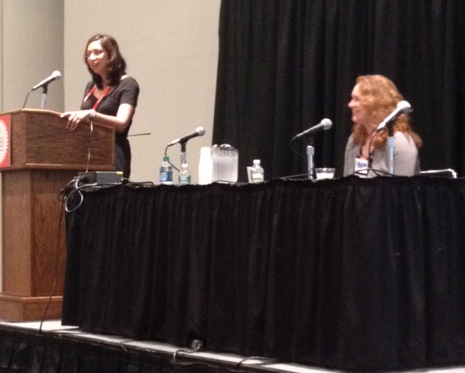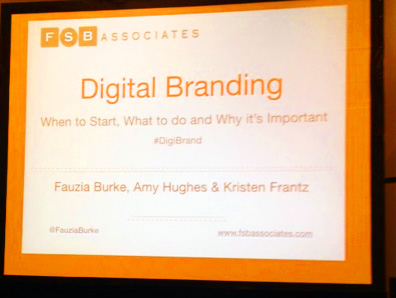
One of the cool things about BookExpo America is that there are seminars aimed at authors, publishers, and so on. For the past few years there has been a whole track of programming about the digital space and using digital tools for marketing and commerce.
Fauzia Burke (of FSB Associates) opened by explaining that agent Amy Hughes caught the flu and so didn’t make it, so it was just her and Kristen Frantz (VP of sales and marketing at Berrett-Koehler Publishers).
Fauzia began by answering the question, What is digital branding? “Think about what comes up when you do a Google search for a person. Your website, your social assets, etc.”
“I know the authors in this room are thinking I wrote the book, now I have to be a marketing expert, too? But yes, you have to think about why it’s important. The people who do digital branding get more speaking gigs and they spell more books. If you had a one tweet equals one book sale ratio we would all do it, right? It isn’t so obvious, unfortunately, and it’s not just a sales tool.”

She broke digital branding down into 3 components/categories:
• Design
• Engagement
• Visibility
Her main initial point was no matter which component you are working on, “Represent yourself as professionally as possible.”
Google calls it the “zero moment of truth,” the moment when you hear about someone or something and the first thing you do is Google them. That’s when you “make the sale” — right at the beginning. What do people find and what do they think about what they find?
Fauzia, “People make their first impression in a tenth of a second.” So you have to have a look that doesn’t just “capture your brand,” it has to make you look trustworthy and likeable.
The graphic elements people will see:
Website
Social Media Assets/Accounts
Graphics
Book Jacket(s)
She then showed two different versions of an author website. The first one looked about like a Wikipedia page, very Web. 1.0, with just small text and some links. The other was more dynamic and just better looking overall. Especially for an author who was touting a book about innovation it was important not to look like something from 1990.
Fauzia noted, “If we can build up trust and likeability, you become immune to bad reviews.”
Likeable people
-ask questions
-are honest
-don’t seek attention
-are consistent
-smile
I would add myself that “don’t seek attention” might be better put as “don’t come across as an attention seeker.” It goes hand in hand with the advice many social media “gurus” give, which is “be genuine.”
Here’s one big takeaway from Fauzia: “A smaller more engaged community of followers is WAY more important than the total number of followers.”
Visibility has many elements. It’s all the things that put you in front of the public to begin with, and all the things that may lead them to Google you.
Visibility = publicity, advertising, distribution, events
Visibility — all the elements of visibility bring people back to your website or blog. They are not the end of the process, they are the beginning.
There’s also a fundamental difference between social MEDIA and social NETWORKING. Some authors think they can just be on Facebook or Twitter all day and not have their own blog or home base. This is wrong. Blogs are traditionally the kind of social media where you CREATE the media and share it. Facebook (and Twitter, LinkedIn) is really social NETWORKING, but you need that blog as a basis.
There were several good questions from the audience and also Fauzia and Kristen asked each other some questions to:
Q: Is facebook driving sales more?
Fauzia: I think it is driving engagement, and engagement does lead to sales. You don’t do it just for the sales, though, but to build audience even before the book exists. That community of followers shapes the book.
Q: How much time should an author spend on social media and website stuff?
Kristen: Some of our authors are on a kind of schedule: try two new things per week. Then the things that seem to be really helping you, keep doing those. Maybe youv’e foudn you really enjoy Twitter, so once a week you’re going to schedule tweets for the whole week, plus you’ll go in a couple of times a day to interact, and you’ll blog twice a week consistently. We’re a nonfiction publisher and what we see is our authors out there speaking, then they’ll reinforce their social media which will lead to more speaking down the road.
Fauzia: When is the right time for authors to start focusing on their digital brand?
Kristen: We usually say one year before their book comes out. The thing is you’re building your network and your ideas through speaking and writing and then the book is a culmination of that. It’s rare to see a book work without a built in community and network. The ones that don’t and that are successful are luck and impulse buys.
Fauzia: Let’s talk a little about our experience with small community versus large number of followers.
Kristen: We just did a book who had a huge twitter following, over 100K, and a big web presence, but in hindsight it was very segmented. The branding was really inconsistent. We saw people love to retweet his stuff, this is going to lead to a lot of book sales! But it actually wasn’t. He wasn’t consistent, it was hard to find his blog, and he wasn’t consistently sharing content. His audience didn’t come to the book. In hindsight I should have been more forceful with him, “we need ONE website we can point people to, you need to blog consistently.”
Fauzia: Can you speak a little about generosity?
Kristen: (Described an author who always posted free articles on her website. She wrote a groundbreaking business book in 1992 and became a foremost authority. ) This author would say, “I was never afraid of people ‘stealing’ my ideas. The more I can share, the more my ideas are getting out there.”
Q: Another question about Facebook: people keep mentioning it, I think it’s changing in scope and usage, we hear young people aren’t on it anymore, but my generation were fascinated for a while finding people we went to high school with but now we don’t have time for it anymore…? (She appears to be late 40s)
Kristen: With social media it’s better to be consistent that to be on ALL the platforms. If the author likes Facebook they should stick with Facebook. BUT… At Barrett-Koehler we don’t find it very effective. We’ll do a post and no one will see it unless we pay to promote it. So we downplay it to our authors and we find Twitter a much better forum.
Q: Are you using surveys to find out if you’re reaching the right audience?
Fauzia: I think you are better off using your social media as a part of finding out what your audience wants.
Kristen: We do surveys on titles, though, and authors use it as a way to engage their community. Our editors also use it as a way so say “look, your audience prefers this title”.
Q: All you talked about is nonfiction writers. Can you give some advice to the fiction writers?
Fauzia: You are so right. Fiction writers don’t have the “expertise” component, but honestly the fundamentals are the same, and the fiction authors are probably better at the “likeability” component. But yes, this presentation was very nonfiction-heavy. About 80% of the authors we work with are nonfiction.
One last tip was about NOT creating a specific website for each book. (The amusing thing is at another conference I was at there was a workshop on doing exactly that. Huh.)
Fauzia: Never ever now do a website for a book. We used to do separate websites and facebook pages and twitter feeds for each book Who has time for that? Brand yourself not the book.
Kristen: The main thing is the branding is the author. You have to be known for YOU, not just this one topic or this one book.
I’m hoping to catch a presentation specifically on Facebook later today! (It was clear to me that most people in the room still did not understand that when people look at Facebook they read from their wall, they don’t look at individual pages, and that Facebook’s algorithm messes with what you see on that wall. You never see everything.)
